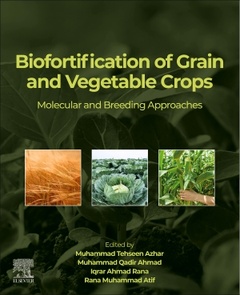Biofortification of Grain and Vegetable Crops Molecular and Breeding Approaches
Coordonnateurs : Azhar Muhammad Tehseen, Ahmad Muhammad Qadir, Rana Iqrar Ahmad, Atif Rana Muhammad

2. Maize biofortification in the 21st century
3. Biofortified rice in zero hunger challenge: current status, problems and future opportunities
4. Agronomic and Genetic Biofortification of wheat: progress, limitations and prospects
5. Barley biofortification for food security: Challenges and future prospects
6. Biofortified Sorghum: A prospectus of combating malnutrition
7. Biofortification of Soybean to enhance micro-nutrients
8. Biofortification of Chickpea: Genetics, Genomics and Breeding Perspectives
9. Biofortification potential of neglected protein legumes for combating hidden hunger in resource-poor countries
10. Biofortification of Brassicas for oil and quality improvement
11. Tomato Biofortification: Evidence and Tools linking Agriculture and Nutrition
12. Biofortified Carrots: Capitalizing Omics Tools
13. Biofortification of potato to reduce malnutrition
14. Biofortified Sweetpotato: An Ideal source of mitigating hidden hunger
15. Cassava : A Potential candidate for biofortification exploration
16. Biotechnological overview of cauliflower for biofortification
17. Biofortified lettuce: A potential opinion to fight hunger
Dr. Muhammad Tehseen Azhar is working as Associate Professor at the Department of Plant Breeding and Genetics, University of Agriculture, Faisalabad-Pakistan, where his primary responsibility is teaching to graduate and post-graduate classes. Besides, his focus is screening and development of segregating population resulting in the development of several bulks of cotton with more yield and fibre traits. Dr Azhar has specific interest in the development of cotton germplasm having tolerance to biotic and abiotic stresses. These advanced strains of cotton have showed good performance for yield of cotton in national traits and those genotypes are suitable for cultivation in high temperature and water stress conditions. Being a Borlaug Alumnus, he worked with various cotton geneticists namely, Dr Richard Percy, Dr Lori L. Hinze and Dr Jame Frelichowsk at Texas A&M University and USDA-ARS, USA. Dr Azhar has completed various research projects funded by Higher Education Commission, Pakistan; CAS-PARB and Cooperation Organization Partnership for Science and Technology, China. Besides, Dr Azhar is Endeavour Alumnus and appointed as Adjunct Lecturer at the School of Plant Biology, UWA. Recently he is appointed as Adjunct Associate Professor, School of Agriculture Sciences, Zhengzhou University, Zhengzhou, China. Due to his consistency Dr Azhar is appointed as a Chair (20219-2021) of Germplam and Genetic Stock in International Cotton Genome Initiative (ICGI). He is winner of ASIA Young Scientist Innovation Gold Medal-2023 from International Cotton Researchers Association (ICRA), a sub-committee of International Cotton Advisory Committee (ICAC), Washington.
Dr. Muhammad Qadir Ahmad is working as an Assistant Professor at the Department of Plant Breeding and Genetics, Faculty of Agricultural Sciences and Technology, Bahauddin Zakariya University, Multan, Pakistan. He earned his PhD degree from the University of Agriculture, Faisalabad, Pakistan, in 2013. Additiona
- Presents the potential of a variety of food crops for increased bioavailability of micronutrients
- Enhances our understanding of agronomic and molecular mechanisms of biofortification
- Provides insights to mitigate hidden hunger
Date de parution : 11-2023
Ouvrage de 350 p.
19x23.4 cm



